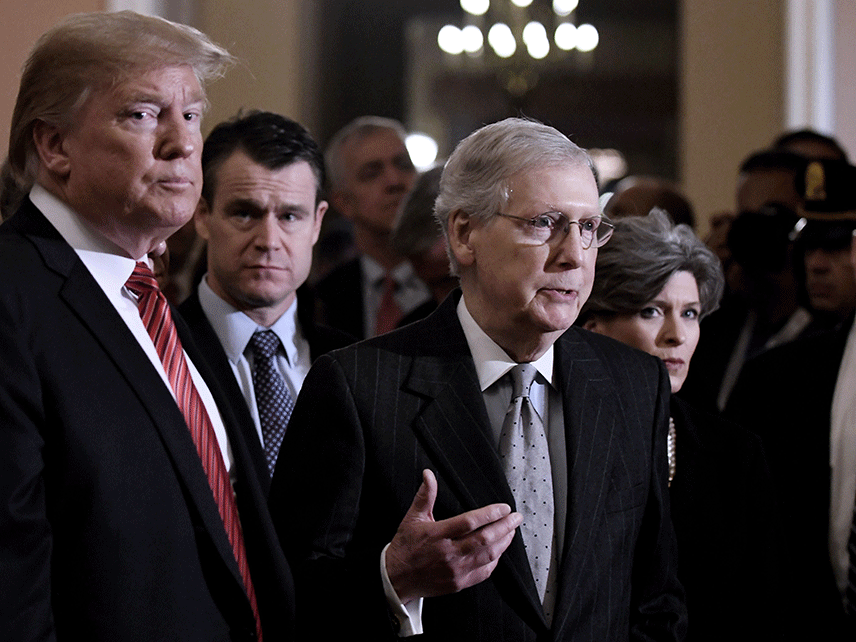Mitch McConnell Predicted the GOP Tax Cut Would Raise Revenue and Reduce the Deficit. Nope.
A year after the tax law, growth is up but tax revenue is down.

For years, the supply-side argument that tax cuts "pay for themselves" has been an article of faith among Republican lawmakers. The idea, which dates back decades, is that lowering tax rates will result in an increase in economic activity and a commensurate increase in tax revenues that makes up for any revenue lost to rate reductions.
The evidence for the stronger versions of this proposition has always been weak at best; growth can offset some revenue losses, but it rarely produces enough revenue to completely "pay for" a tax cut. Yet it has persisted in Republican circles because of its political convenience: It provides a tidy and simple justification for tax cuts without spending cuts.
Its influence has remained strong during the Trump presidency. At the end of 2017, for example, when Republicans passed the Tax Cuts and Jobs Act, Mitch McConnell insisted that this was exactly what would happen. "I not only don't think it will increase the deficit," he said, "I think it will be beyond revenue-neutral. In other words, I think it will produce more than enough to fill that gap."
There was no reason to believe this at the time. Not one credible analysis of the tax law—even from pro-tax-cut, GOP-friendly sources—saw this as a likely result. And now that the tax bill has in place for a year, there is still no evidence that it's happening, nor any evidence that most Republicans are reconsidering the party dogma.
Yes, economic growth has exceeded expectations. But as Jim Tankersly writes in The New York Times, "the additional tax revenue has yet to show up, even with stronger growth." In fact, the federal government's tax revenue dropped by about $83 billion. The Tax Foundation, which tends to favor tax reductions, has revised its estimate of the likely deficit increase stemming from the law from $450 billion to about $900 billion over the next 10 years. The tax law has made the deficit larger, and it is likely to continue making it larger over time.
That doesn't mean that tax cuts have to increase the deficit. The deficit is simply the gap between the federal government's revenues and outlays—what it brings in and what it spends. The trick to avoiding a larger deficit is to offset tax cuts with spending cuts.
But that is not what McConnell did. A few months after ushering the tax bill into law, he helped broker a deal with Democrats that increased domestic spending (a Democratic priority) in exchange for increasing military spending (a Republican priority).
As with reducing taxes, raising spending also expands the deficit. That the deficit would expand in following a one-two punch of lower tax revenues and higher federal spending is perhaps the most obvious fiscal result imaginable. Spend more and tax less, and the gap between spending and revenues will expand. That's exactly what has happened, and now the deficit is on track to hit $1 trillion years earlier than expected when Trump took office.
McConnell helped both the lower taxes and the spending increases come into effect, yet he argues that his party has no unique responsibility for the resulting increase in the deficit. In an interview last year, he called the nation's rising budget deficit "very disturbing"—but then went on to say that his party shoulders no blame. "It's disappointing, but it's not a Republican problem," he told Bloomberg News. Instead, he argued that it was a bipartisan failure to tackle entitlement spending that was driving the nation's debt build-up.
There is truth to that. The major entitlement programs—Medicare, Social Security, Medicaid—are the biggest drivers of the long-term debt, which now exceeds $20 trillion. But annual deficits, while related, are not the same as total federal debt. And it was under Republican control of Congress and the White House that the policies driving our surging deficits were put in place.
It's not too hard to understand the political convenience of knee-jerk supply-siderism: It offers a justification for tax cuts, which are popular, without spending cuts, which are not. But while libertarians might like the idea of lower taxes, the result is a government that seems cheaper than it is, by deferring the cost. It ends up being a way to let government grow larger while insulating taxpayers from the price tag.
Republicans spent years pretending to be outraged about trillion-dollar deficits under Barack Obama. McConnell's argument, which is essentially that Republicans couldn't realistically do anything to reduce the deficit under Donald Trump, is a flagrant abdication of fiscal responsibility, an open refusal to tackle a problem that McConnell and many of his fellow Republicans (including, from time to time, President Trump) have complained about for years.
Yes, the Republican commitment to fiscal responsibility has, for the last several decades, been more rhetorical than real. But under Trump, who on the campaign trail ruled out major entitlement reforms and who has called himself the "king of debt," the party has nearly done away with the pretense entirely, with predictable results. At this point, the GOP position on the budget amounts to a giant collective shrug.


Show Comments (179)